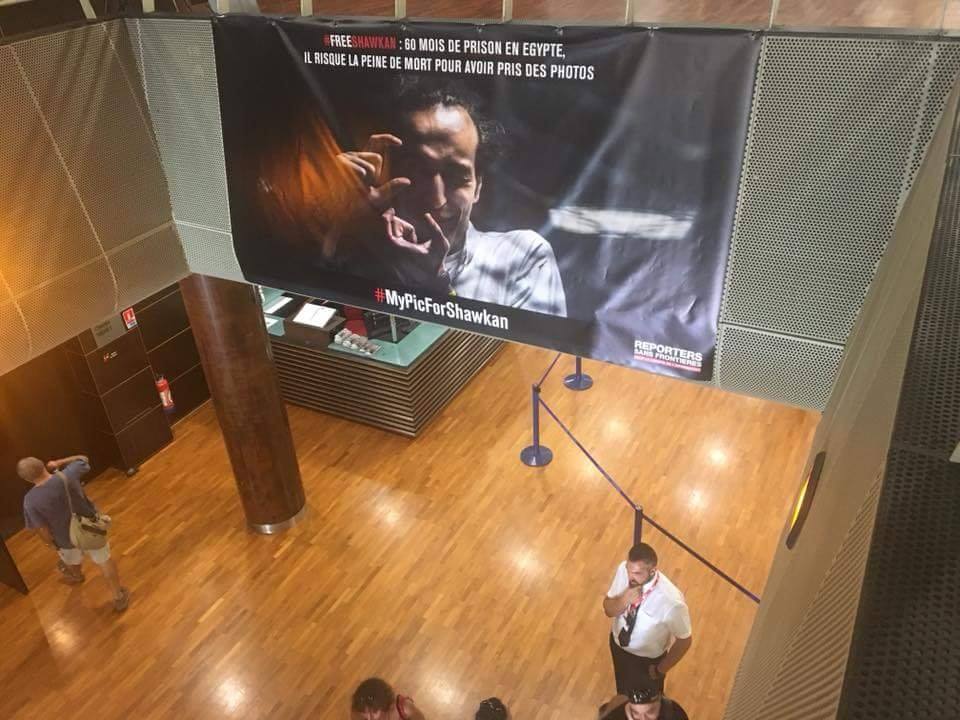
CAIRO — A prominent Egyptian photojournalist was released after five years in prison and returned home on Monday to hugs from his family and friends, pledging to continue working despite having to spend the nights at a police station nearby.
Mahmoud Abu Zaid, popularly known as “Shawkan,” was convicted of involvement in a 2013 sit-in protest by Islamists that was broken up by Egyptian security forces in an operation that left hundreds dead.
His case comes as Egypt, under President Abdel-Fattah el-Sissi, has launched an unprecedented assault on reporters and the media in recent years, imprisoning dozens and occasionally expelling some foreign journalists.
Shawkan was taking photos at the Rabaa Al-Adawiya Square in Cairo where Muslim Brotherhood supporters had staged a sit-in protest in August 2013 to denounce the ouster and detention weeks earlier by the military of the country’s freely elected but divisive Islamist President Mohammed Morsi.
“I was heading out to take photos. I come back to my home after five years,” Shawkan told The Associated Press at his home in Cairo’s neighbourhood of Fisal, shortly after his release.
His lawyer, Taher Abuel-Naser, said he was released from a police station earlier in the morning. An Egyptian court had ordered Shawkan’s release last September after he had served out his term, but he remained behind bars for an additional six months in lieu of paying a fine for property damages incurred during the Rabaa Al-Adawiya crackdown.
Shawkan said that under his sentencing and following his release, he has to report to the nearest police station and spend every night there from 6 p.m. till 6 a.m. for the next five years because he has been remanded under “police observation” for that time.
He is also prohibited from managing his financial assets and property for the duration of those five years.
Despite these restrictions, Shawkan said he would continue working as a photojournalist. “I am not the first or the last journalist to be detained,” he said.
“I feel like I was born again, I feel relieved,” said his mother, Reda Mahrous. “I used to stay awake at night thinking, telling myself that Mahmoud will come back today or tomorrow.”
The Committee to Protect Journalist welcomed Shawkan’s release on Monday and urged Egyptian authorities to “end their shameful treatment of this photojournalist by removing any conditions to his release.” Shawkan was honoured with CPJ’s International Press Freedom Award in 2016.
“We are relieved to hear that Shawkan is finally free,” said Sherif Mansour, CPJ’s Mideast and North Africa co-ordinator. “The Egyptian government should take steps immediately to improve its image, which has been badly tarnished by this unjust imprisonment.”
Egypt remains among the world’s worst jailers of journalists along with Turkey and China, according to CPJ. In December 2018, CPJ’s annual prison survey found that at least 25 journalists are in prison in Egypt, and that the country leads the world for charging journalists with publishing false news.
Since 2013, el-Sissi has overseen the biggest crackdown on critics in living memory, jailing thousands of Morsi’s supporters as well as some of the iconic activists behind the 2011 uprising that toppled former autocratic President Hosni Mubarak.
A general-turned-president, el-Sissi has rolled back many of the freedoms won by the anti-Mubarak uprising, silenced most dissenting voices in the media and placed severe restrictions on civil society groups.
The Muslim Brotherhood has been outlawed as a terrorist group.
Last April, the United Nations’ cultural agency ignored warnings from the Egyptian government and awarded Shawkan the World Press Freedom prize.
At the time of his award, UNESCO’s jury president Maria Ressa said the prize, which recognizes the promotion of press freedom especially in the face of danger, “pays tribute to his courage, resistance and commitment to freedom of expression.”